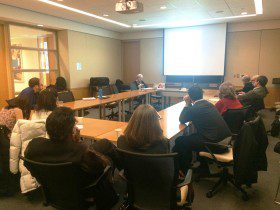 By Divya S. Sooryakumar, Ed.M Candidate, International Education Policy, Harvard Graduate School of Education; SAI Student Coordinator
By Divya S. Sooryakumar, Ed.M Candidate, International Education Policy, Harvard Graduate School of Education; SAI Student Coordinator
On Tuesday, March 31st, Maristella Casciato, Associate Director of the Canadian Centre for Architecture (CCA), Montreal, spoke at a SAI Urbanization Seminar about her work on development and politics of postcolonial cities. She used case studies from around the world, including India and Pakistan. The seminar was moderated by Rahul Mehrotra, GSD.
Casciato discussed the challenges that the end of colonialism brought to the region, as governments and countries had to find their own identities. She described the development of cities in the postcolonial era as “transitioning cities”.
Specifically speaking about both India and Pakistan as case studies, she discussed how the Partition added a layer of complexity to the challenges of planning new cities. Specifically, the influx of refugees to India from the newly formed Pakistan required that the cities had to not only develop new towns and settlements, but also handle the “re-education” of the population – help them find jobs and adjust into daily life in these “new” cities.
Casciato also spoke at length about the planners themselves and the involvement of international organizations like the United Nations in sending professionals to the developing world to assist them with their planning processes. For example, Casciato discussed Constantinos Doxiadis, the lead architect of Islamabad, the new capital of Pakistan. She also discussed Otto Königsberger, the lead architect of multiple Indian cities. She used these individuals to explore the nuanced and complex relationship that city planners have the cities they plan.
During the Q+A session, an eager audience aimed to understand how the lessons from this era can be applied to better understand urbanism in South Asia today.
